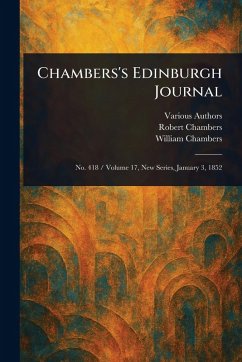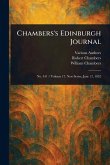Step back in time with "Chambers's Edinburgh Journal, No. 418, Vol. 17, Jan 3, 1852," a fascinating periodical offering a glimpse into 19th-century Great Britain, specifically Scotland. Authored by William Chambers and Robert Chambers, this republication presents a collection of essays that reflect the historical context of the era. Explore the general subjects and observations that captivated readers in 1852 through meticulously preserved articles. A treasure for enthusiasts of history and British culture, this journal provides a unique lens onto the social, political, and intellectual landscape of the time. Perfect for those interested in historical periodicals, Scottish history, and general European history, this volume captures a moment in time with enduring appeal. This work has been selected by scholars as being culturally important, and is part of the knowledge base of civilization as we know it. This work is in the public domain in the United States of America, and possibly other nations. Within the United States, you may freely copy and distribute this work, as no entity (individual or corporate) has a copyright on the body of the work. Scholars believe, and we concur, that this work is important enough to be preserved, reproduced, and made generally available to the public. We appreciate your support of the preservation process, and thank you for being an important part of keeping this knowledge alive and relevant.
Bitte wählen Sie Ihr Anliegen aus.
Rechnungen
Retourenschein anfordern
Bestellstatus
Storno









